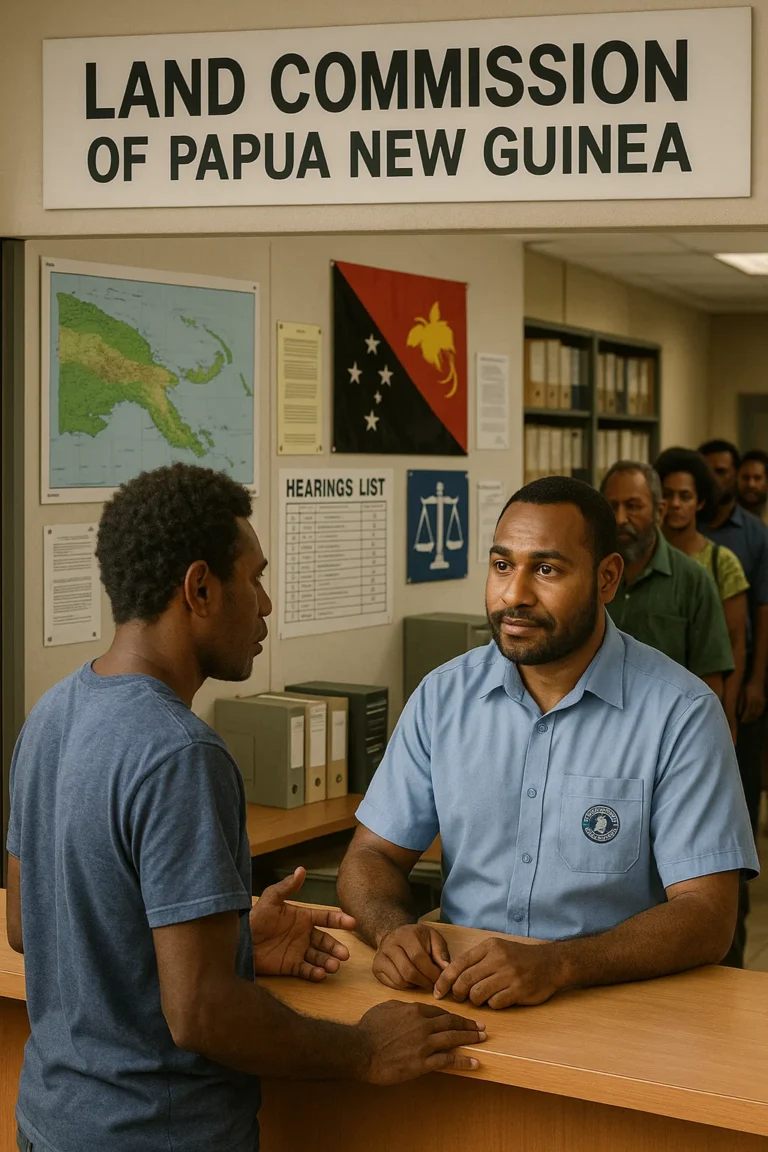Frequently Asked Questions
Let’s clarify the roles of the Department of Lands and Physical Planning (DLPP) and the Land Commission in Papua New Guinea, incorporating the correct information about the Land Commission’s formation and functions.
- Department of Lands and Physical Planning (DLPP)
The DLPP is the principal government agency responsible for managing state (alienated) land in Papua New Guinea. Its core responsibilities include:
- Land allocation and leasing: Administering the allocation and leasing of state land for various uses.
- Land registration and titling: Overseeing the registration of land titles and maintaining accurate land records.
- Urban and regional planning: Developing and implementing land use plans, zoning regulations, and development control guidelines.
- Land surveys and mapping: Conducting land surveys and producing maps to support land administration.
- Policy development: Formulating policies related to land management and development.
The DLPP plays a crucial role in facilitating land access, ensuring sustainable land use, and supporting economic development through effective land management.
- Land Commission of PNG
The Land Commission is an independent quasi-judicial body established under the Land Commission Act 2022. It is a merger of the Land Titles Commission (LTC) and the National Land Commission (NLC), as recommended in the 2007 White Paper on the Law and Justice Sector. The Land Commission’s primary focus is on customary land and historical land tenure issues.
Key functions of the Land Commission include:
- Determining land tenure conversion applications: Assessing applications to convert customary land tenure to formal titles under the Land (Tenure Conversion) Act 1963.
- Investigating and determining ownership of customary land: Conducting inquiries to ascertain rightful ownership of customary land, particularly in cases involving historical acquisitions.
- Maintaining the National Land Registry: Keeping accurate records of national land and titles issued under the Land (Tenure Conversion) Act 1963.
- Assessing settlement claims: Evaluating claims for settlement payments on land acquired by the State prior to independence.
- Conducting hearings: Holding formal hearings to gather evidence and testimonies related to land ownership and tenure issues.
The Land Commission operates independently from the Department of Justice and Attorney General, ensuring impartiality in its quasi-judicial processes.
You can obtain Land Titles Commission (LTC) and National Land Commission (NLC) forms in two ways:
- Online – Visit the official Land Commission website and go to the Downloads section. There, you will find downloadable forms for LTC and NLC matters, including application forms and other relevant documents.
- In Person – You can also collect the forms directly from the Land Commission Office located at: WNB Haus, Level 3, Waigani, Independence Drive, Port Moresby.
The staff there can assist you with the right forms and provide guidance on how to fill them out if needed.
Anyone who has a claim to customary land in Papua New Guinea can apply for tenure conversion to formal land titles. This typically includes individuals, communities, or clans who wish to have their land recognized and formally registered. The application must include relevant documentation, such as proof of ownership or evidence supporting the claim.
If you wish to convert customary land into formal titles, you can apply through the Land Commission. The application process involves providing documentation to support your claim of ownership. The Commission will then assess the application, which may include conducting an investigation, gathering evidence, and holding hearings before making a determination.
The Land Commission does not directly resolve land disputes. Its role is to investigate and determine land ownership, particularly regarding customary land. The Commission may hold hearings to gather evidence and determine rightful ownership, but it does not intervene in everyday land conflicts. For disputes, the Commission may make recommendations or provide guidance to other relevant authorities.
How can we help you today?
Contact the Land Commission for expert guidance and support.
